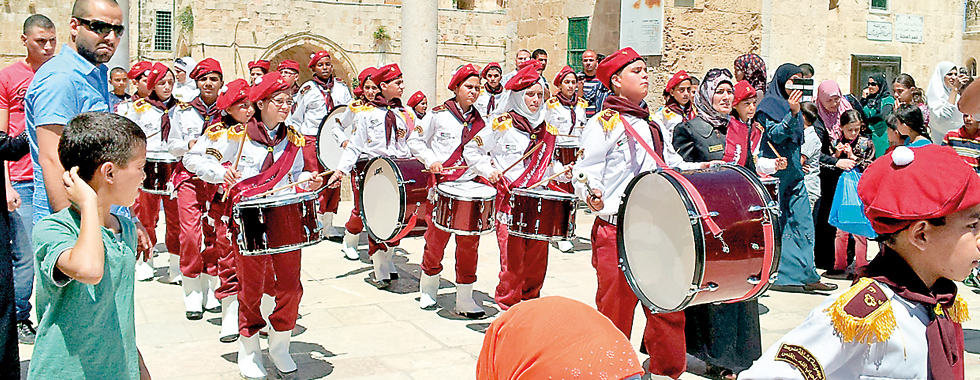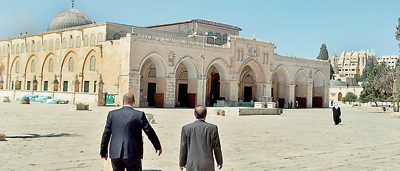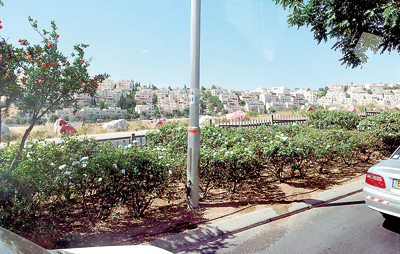Sunday Times 2
Palestine: A taste of apartheid and colonialism
Travelling in a lead escort vehicle driven by a police officer can be thrilling for a speed enthusiast. The lead vehicle, an SUV, in which I was occupying the rear seat, was cruising at top speed along the well-paved carpeted motorway with other vehicles in the VIP convoy following.

Palestinian schoolchildren asserting Palestinian sovereignty at the Al-Aqsa mosque compound in a show of defiance.
At an intersection the lead vehicle stopped for the red light. But as it was gradually picking up speed after the light turned green, a soldier at a checkpoint some 100 metres ahead of the traffic light signalled the lead vehicle in the convoy to pull over. The police driver obeyed and braked, but his colleague in the vehicle yelled at him to speed on. The driver took his colleague’s advice and sped. Instinct told me to duck to avoid a bullet, but before that I turned to see what the reaction of the soldier was as we moved past the checkpoint. Half-heartedly, he was raising his automatic rifle, a Tivor or an M-16. But moments later when the other vehicles in the convoy caught up with the lead vehicle in which I was travelling, the soldier realised his folly and lowered the gun.
The incident which was soon forgotten was symbolic of the clash of sovereignty in the Palestinian territory. The vehicle in which I was travelling belonged to the Palestinian police force, the VIP convoy was carrying the Maldivian President Mohammed Waheed, Maldivian Foreign Minister Abdul Samad Abdullah and Sri Lanka’s senior minister A.H.M. Fowzie. We were returning from Hebron to Ramallah. The soldier at the checkpoint was an Israeli.
The Palestinian police officer in the vehicle told us that the Israeli soldier knew in advance of the VIP movement but they wanted to show who was in charge of the West Bank, which Israel has been occupying since 1967. The Palestinians have an administration — the Palestinian Authority — and last year, the United Nations recognised Palestine as a non-voting member state. The administration maintains diplomatic offices in more than 70 world capitals. The Non-Aligned countries, including Sri Lanka, recognise Palestine as a full-fledged state. Yet the Palestinian sovereignty displayed externally is hardly reflected in the West Bank, except for Ramallah where the Palestinian Authority is headquartered, and a few other towns and cities such as Bethlehem.

Al Aqsa mosque, Islam’s third holiest place; Palestinian youths are restricted from entering the mosque.
The minor incident which brought out the Palestinian determination to defy occupation occurred when we were returning from Khalil — Hebron — where we saw for ourselves how Israeli action has brought misery to the Palestinian population. We visited the historic mosque where in 1994 — after the landmark Oslo peace deal was signed by Israel and the Palestinians — some 30 Palestinians were gunned down by a Jewish fanatic while they were at prayer. The mosque is religiously significant to both Jews and Muslims because in it are found the graves of Abraham — Ibraheem to Muslims — and his wife Sarah, and their son Isaac — Is’haaq to Muslims — and his wife Rifqah.
The control of the mosque which was known among the Palestinians as Masjid al Khalil or the mosque of God’s friend Ibraheem is now in the hands of Israeli troops. After the 1994 massacre, Israel set up several iron barriers and security screens. As a result, the Palestinian’s right to worship in the mosque, which is a UNESCO declared world heritage site, has been seriously curtailed. At present, the mosque is divided into a Muslim wing and a Jewish wing and is completely out of bounds for Palestinians on Saturdays — the day on which Jews visit the grave of the Patriarch revered by all three monotheistic religions — Judaism, Christianity and Islam. Several artefacts inside the mosque that asserts the Muslim control of the site for 14 centuries have been destroyed or removed by Israeli military governors in their effort to judaise the Ibrahimi mosque.
Abraham had two sons. His first born Ishmael or Ismaeel was born to Hagar, his second wife, whom the Muslims regards as a noble woman, but Jewish scriptures say was a slave. Abraham’s second son Isaac or Is’haaq was born to Sarah, his first wife. The children of Isaac/Is’haaq are the Jews while the Arabs and Islam’s holy prophet Muhammed are the progeny of Ishmael/Ismaeel. The Arab-Israeli conflict is in a way a case of a family feud or a case of one father two nations.
While in Hebron, the Governor and the Mayor of the occupied West Bank’s largest city with a population of more than 200,000, explained to the visiting Maldivian and Sri Lankan delegates how occupation was adding to the misery of the Palestinians. It has virtually killed Hebron’s economy and severely affected the Palestinian social life.
It all began with a few armed Israeli settlers seizing a Palestinian building in the city centre by force and chasing away its occupants way back in 1968, a year after much of the West Bank came under Israeli occupation following the humiliating Arab defeat in the 1967 war.

This picture shows the apartheid wall that has added to the Palestinian misery.
Today, the Palestinians have to travel in a vehicle for more than 45 minutes to reach a neighbour’s or relatives house just a stone’s-throw away. This is because the Israelis have prevented the Palestinians from even walking close to the illegal settlements occupied by some 500 Jews. To ensure security for these illegal settlers, more than one thousand Palestinian families were evicted from their villages. We were told that more than 1,800 Palestinian businesses closed shop under the Israeli threat following the building of settlements in the centre of Hebron. In addition, some 1000 heavily armed Israeli troops are also billeted at the city centre. We saw some of them at the Khalili/Hebron mosque premises where they prevented the native Palestinians from gaining access to the mosque though they permitted the delegates from the Maldives and Sri Lanka.
Though the city has a Palestinian mayor and a governor, the writ of the Israeli military is conspicuous. Virtually, nothing moves without Israeli military permission. With the Israeli military protecting the armed Jewish settlers, the Palestinians are often at the receiving end and subject to taunts and even physical abuse of Palestinian girls. The roofs of many Palestinian houses have been damaged by rocks thrown from nearby Jewish settlements. Some houses have put wire meshes to protect their roofs. Complaints to the Israeli military, the Palestinians say lead to nowhere. Unable to bear the harassment, many Palestinians have left their homes in desperation. This was perhaps an Israeli strategy to consolidate its land grab.
The Palestinian Authority is helpless. On the one hand its hands are tied by the peace process, which was revived a few weeks ago after it had remained inactive for three years due to Israel’s refusal to heed US president Barack Obama’s advice to stop settlement building activity in occupied Palestine. On the other, it has neither the military power nor the political clout to stop Israel.

An Israeli settlement built on the land grabbed from Palestinians
In the circumstances, one wonders whether the PA’s writ extends beyond Ramallah, the temporary headquarters of the Palestinian administration till such time the Palestinians dream capital is established in East Jerusalem.
It is in Jerusalem – or al-Quds – that one finds Islam’s third holiest site, Masjidul Aqsa, from where Muslims believe Prophet Muhammad began his heavenly journey that took him to God. The walls of the mosque compound are parts of the Jewish temple regarded as Judaism’s holiest site. No visitor can enter East Jerusalem without Israeli permission. Even Palestinians, including state officials, living outside this holy city need prior Israeli permission. Often Israeli soldiers guarding the complex block Palestinian youths from praying at the Aqsa mosque. The waning authority the Palestinian Authority is writ large on the walls of Jerusalem.
How little the Palestinians wield their political or administrative power was visible when one enters Palestinian territory through the Jordan-West Bank border at Allenby Border Crossing — the entry point through which we entered the land of Palestine after travelling from Amman, the capital of Jordan. To our dismay, instead of the Palestinian red-green-black-and-white flag, what we saw was the Israeli flag carrying the blue Star of David.
On paper, the checkpoint is manned jointly by Israel and the Palestinian Authority. In reality, there was hardly any Palestinian presence. Israeli immigration officials who man the entry point, guarded by heavily armed Israeli troops, are no respecters of diplomatic passports or official passports.
We visited Palestine to attend the international conference on Islamic and Christian holy places in Jerusalem. The conference declared open by Palestinian President Mahmoud Abbas and Maldivian President Mohammed Waheed was held in Ramallah because even the Palestinian side of Jerusalem – East Jerusalem – is virtually under Israeli occupation.
After gaining clearance from Israeli immigration at the Palestinian border point, well paved carpeted roads took us through many a city that has made international headlines for its resistance to occupation. As we pass the outskirts of Jericho, an arrow on a road sign pointed towards the turn to Ma’ale Adumim, the West Bank town where Israel has built its third largest illegal settlement.
As we proceeded further – about 15 minutes’ drive from the Allenby Border – we saw Israel’s apartheid wall that it has built across the Palestinian territory to provide security to illegal settlers, causing enormous hardships and social and economic loss to the Palestinian people.
The few days we spent in Israeli occupied Palestine gave us a taste of apartheid and colonialism. As our motorcade wound along snaking roads up the mountains, down the valleys and through farmlands and Bedouin habitats, the contrast was evident. A Palestinian official, who was part of our security detail, told us that the easiest way to distinguish between a Palestinian township and an Israeli settlement was by looking at the rooftop. “If there is a water tank, then it is a Palestinian house. Israeli houses have pipe-borne water. Besides they defiantly flaunt the Israeli flag,” he said.
Activists say Israel robs 80 per cent of the Palestinian water. The Palestinians are forced to stick to the highly unfair water deal with Israel to get their 20 per cent water and run their facility. As a result of this one-sided deal, much of Palestinian arable land remains unused. We were told that because of the water shortage, the Palestinians cannot cultivate. Neither can they sell their land, which is fast turning into deserts and fast losing its market value. Israeli settlers want to buy the land that goes cheap, but no Palestinian would sell it and earn the title “traitor” – or want to do the same mistake which they did 100 years ago when European Zionist Jews including the Rothschilds duped the Palestinians to sell their land.
comments powered by Disqus
